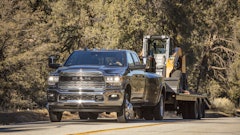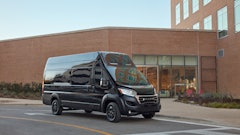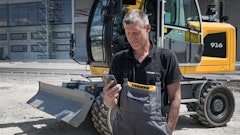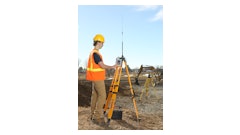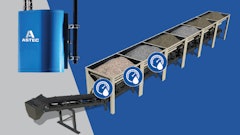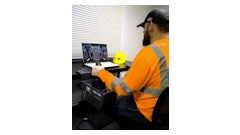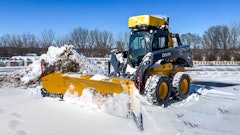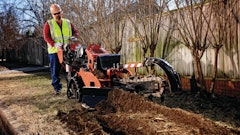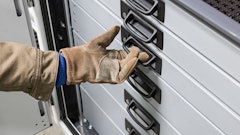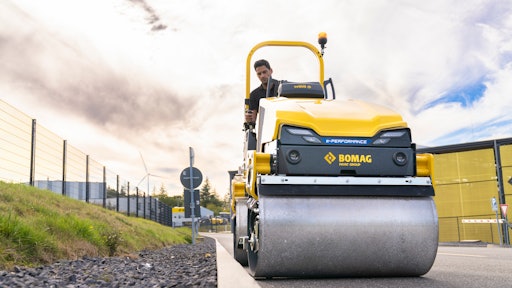
While reflecting on the key differences between maintaining electric vehicles and alternative fuel machines—in comparison to diesel vehicles—Lars Arnold, product manager, Sustainable Power, Volvo Construction Equipment (CE), believes one straightforward, yet primary distinction stands out: they don’t have engines to maintain. In addition to this critical dissimilarity, electric vehicles and alternative fuel machines provide operators two other vital differences, with regard to their performances in high altitudes and cold temperatures.
“Battery electric construction equipment actually tends to perform better at higher altitudes, compared to diesel combustion engines,” Arnold stressed. “A naturally aspirated diesel engine will lose 3% of power for every 1,000 feet of elevation gain over sea level.”
After all, diesel engines require regular maintenance, such as fuel filter changes and oil changes. So, as altitudes increase, their performance may be further affected, leading to the potential necessity for additional maintenance. In comparison, electric vehicles have fewer moving parts than diesel vehicles. Hence, they’ll never require the same amount of maintenance, resulting in consistently higher performance. To minimize their maintenance hours substantially, operators can utilize Volvo CE’s electric vehicles, including its DD25 Electric asphalt compactor. A zero-emission, 6,195-pound compactor, the DD25 Electric utilizes a maintenance-free 48-volt battery, leading to 24 kWh of power without requiring hardly any upkeep whatsoever.
Alongside their minimal maintenance requirements, Volvo CE’s electric vehicles perform well in cold temperatures too, as they’re rated for a range of 14º F to 104º F. Although this is a wide range when compared to many other offerings on the market, the manufacturer’s electric vehicles have operated in even colder temperatures as well, all the way down to -13º F so far.
“Our advice is to store the vehicles inside, so that their batteries reach indoor temperatures,” Arnold said. “Then, when you take them out in the cold, their battery packs—which weigh about 114 pounds each—will take longer to reach whatever the outdoor ambient temperature is, which, in turn, means operators have more time to use them.”
If the batteries are stored outside, they aren’t likely to be affected or damaged by a light frost, as they can be stored in temperatures as low as 14º F. In fact, due to Volvo machines’ designs, the batteries will remain protected at all times. And, as a result, the machines simply won’t power up or accept any charging until the batteries warm back up.
Aside from performing effectively and consistently in cold temperatures, Volvo CE’s electric vehicles also require less maintenance than diesel models during cold days. For example, according to Arnold, diesel vehicles take longer to heat up to operating temperatures than electric vehicles. Not to mention, diesel engines typically don’t start up very easily in cold temperatures, as water tends to freeze up in their water separators.
To compare, on electric vehicles, operators don’t have to service anything around their electric parts, aside from conducting visual inspections whenever necessary.
“Although electric vehicles are much easier to maintain than diesel models, it’s important to remember that they’re heavier, so their tires may wear out a little faster, depending on where (and how) they’re used,” Arnold stated. “Snow tires can extend tire life though, while also enhancing operators’ safety in slippery conditions.”
Low Maintenance Leads to Higher Financial Assets
In the past, BOMAG Americas has been committed to decreasing its operators’ maintenance tasks, as it has introduced features like maintenance-free articulation joints on its machines. With this dedication in mind, the manufacturer has minimized operators’ maintenance requirements even further by offering a new lineup of electric light tandem rollers, which features the BW 100 ADe-5 and BW 120 ADe-5.
“Operators will no longer need to perform daily maintenance tasks like checking engine oil,” emphasized John Gravatt, product marketing manager. “Periodic maintenance items, such as cleaning air filters and changing engine oil, along with engine oil filters, will be eliminated, too.”
Therefore, according to Gravatt, operators only have to perform one major component of maintenance now: hydraulic oil changes.
“The bottom line? When compared to internal combustion engine (ICE)-equipped machines, BOMAG’s electric light tandem rollers’ maintenance is considerably lower,” he said.
As further examples of electric vehicles’ and alternative fuel machines’ maintenance simplicity, they don’t have any diesel exhaust fluid, fuel filters or internal combustion engines either. Of course, although their electrical components hardly require any maintenance, their non-electrical components, including hydraulic pumps and hoses, will need consistent maintenance though.
“Prior to performing any maintenance on non-electrical components, operators must implement the same risk assessment processes that they would for their electrical components,” Arnold stated. “Consequently, operators have stressed how straightforward Volvo CE’s electric vehicles’ maintenance is.”
Additionally, contractors prefer to utilize electric machines like BOMAG’s electric light tandem rollers more than traditional machines for one key reason. Since they have fewer service requirements, the rollers ensure contractors’ machines’ uptime will rise, as they won’t spend nearly as much time or money on maintenance and service as they otherwise would have.
Aside from their maintenance simplicity, electric machines will shut off whenever they’re not being used. In doing so, their idle hours won’t accumulate, as is the case with diesel machines and vehicles.
“For those who worry about electric machines’ higher purchase prices, Volvo CE focuses on the bigger picture instead: the total cost of ownership,” Arnold stressed. “Since electric machines reduce owners’ maintenance requirements, while enabling their operators to also take on zero-emissions work, owners’ initial investments will be offset quickly.”
He added, “And, since electric machines don’t have any idle time, they’ll accumulate fewer operating hours, which supports resale value.”
Overcome the “Newness” of Electric Offerings
Although Volvo CE has received considerable positive feedback, with regard to its electrical offerings’ simpler maintenance, operators must bear in mind that the products are new. Due to this “newness,” some operators will consider any changes, associated with the offerings, to be difficult at times. Furthermore, electric machines require time, aside from when they’re being used, as some electrical training is necessary as well.
“Since electrification is an evolution that all heavy equipment owners and operators will eventually experience, they have an opportunity to learn now and continue to do so, ensuring they’re ready for the future,” Arnold said.
Gravatt agreed, adding that the introduction of new technologies like electric vehicles to fleets may lead to discomfort among operators. This discomfort is particularly due to their freshness, along with changes in components and the ways in which they operate, when compared to traditional diesel vehicles.
“But BOMAG’s electric light tandem rollers give our customers a way to introduce electric vehicles to their fleets with minimal pushback since their hydraulic systems are very similar to their ICE equivalents,” he explained.
To overcome the “newness” of electric vehicles, Arnold advises operators to focus on their lack of complexity above all else. For example, unlike diesel vehicles, electric vehicles only need grease and hydraulic oil. Moreover, they don’t require daily component, filter and fluid examinations either.
On the other hand, when it comes to aspects of electric vehicles that are more challenging to manage, in comparison to diesel vehicles, Arnold believes it’s important for operators to realize they can receive training on a consistent basis—often from manufacturers themselves. Thus, they’ll never have to feel like they’re learning about their electric vehicles’ components completely on their own.
“Electric vehicles’ electrical components are sealed and guarded, so operators should be trained on how to properly disconnect high-voltage power from any parts before they’re removed or replaced,” Arnold said. “Volvo CE offers a solution though, as it has stringent training and qualification requirements to certify technicians for electrical or non-electrical components, prior to utilizing its electric vehicles.”
Just as importantly, electric components, such as AC to DC power converters, battery management units, charging plugs, inverters and lithium-ion batteries, only require visual and functional inspections. If any of these components happen to stop working, operators will never have to worry about repairing them. Instead, each component can be replaced whenever necessary.
In addition, whenever diagnostics reveal the need for component removal, qualified technicians should conduct risk assessments, while traction voltage systems should be disconnected and decommissioned. Each of these tasks must be conducted only by individuals who have completed thorough, certified training programs, thereby ensuring operators remain as safe as possible.
“Most training will focus on safety. Although electrification is a big shift, it’s part of the ever-evolving heavy equipment industry, much like when telematics and in-cab displays became more prominent,” Arnold concluded. “When operators consider the complexity of internal combustion engines—along with the differences between diesel and gasoline engines and two- or four-stroke engines, as well as the fact that engines have an average of 2,000 moving parts—electric vehicles and machines don’t seem so complicated.”
He added, “In fact, when all is said and done, electrification will simplify operators’ daily responsibilities, enabling them to focus more on other tasks, aside from constant maintenance, resulting in higher productivity long term.”





